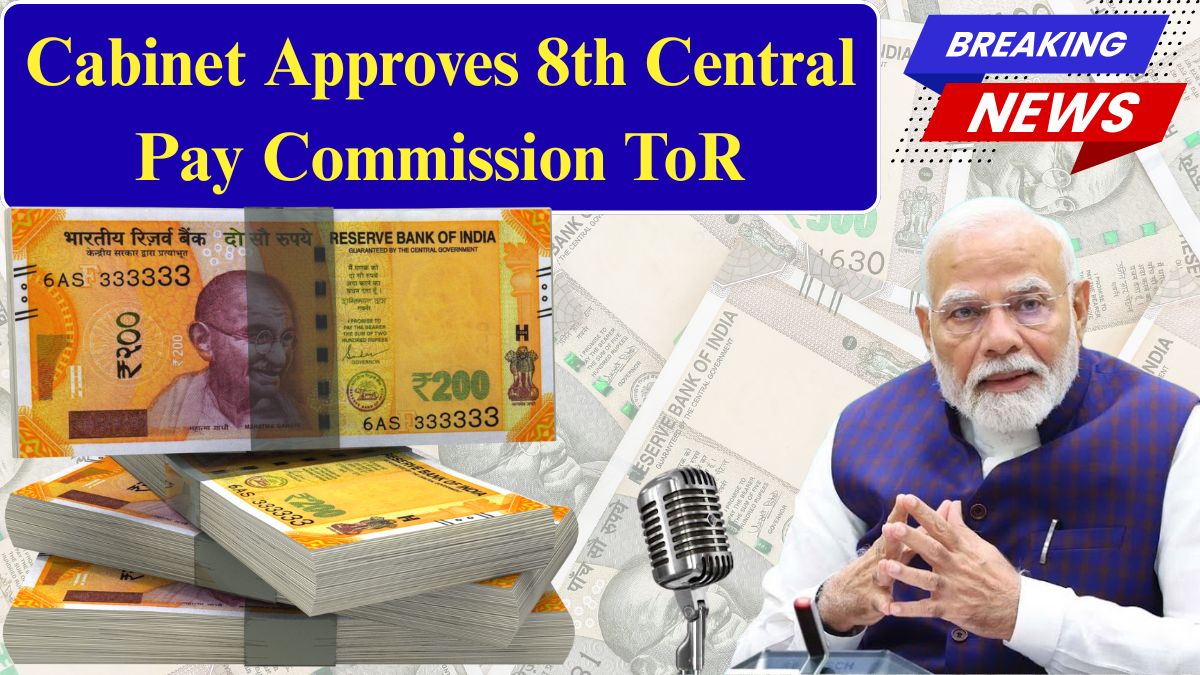Cabinet Approves 8th Central Pay Commission ToR If you’ve been counting the years since your last pay hike or worrying whether your pension can keep up with the rising cost of living, here’s a reason to breathe easier. The Central Government has officially approved the Terms of Reference (ToR) for the 8th Central Pay Commission (CPC) — a move that could change the financial lives of millions of employees and pensioners across India.
This isn’t just another government order. It’s the beginning of long-awaited relief for those who’ve worked tirelessly for years, waiting for their earnings to reflect their dedication and sacrifice.
PM Modi Clears the Path for the 8th Pay Commission
Under the leadership of Prime Minister Narendra Modi, the Union Cabinet has approved the formation of the 8th Central Pay Commission, setting the process in motion for a complete salary and pension structure review.
The commission will be led by Justice Ranjana Prakash Desai, a former Supreme Court judge known for her integrity and balanced approach. Alongside her, Prof. Pulak Ghosh from IIM Bangalore will serve as the part-time member, and Pankaj Jain, Secretary in the Ministry of Petroleum and Natural Gas, will take the role of Member Secretary.
The team has been given 18 months to finalize its recommendations. Once the report is ready and approved, the new pay scales could take effect from January 1, 2026.
For nearly 50 lakh central government employees and 69 lakh pensioners, this announcement means more than numbers — it means recognition, stability, and a sigh of relief after years of waiting.
What the 8th Pay Commission Will Focus On
The purpose of the 8th Pay Commission goes far beyond a simple salary increase. Its goal is to bring fairness and balance between the cost of living and the income of employees who have served the nation with dedication.
The commission will deeply examine the existing salary structures, allowances, service conditions, and pension benefits. It will recommend revisions that reflect current economic realities — inflation, fiscal health, and overall national growth.
The government has also directed the commission to consider how these recommendations will affect state finances, as many states follow central government patterns when revising their own pay structures. It will also compare compensation in public sector undertakings and the private sector, ensuring government employees are not left behind.
This isn’t just a financial reform — it’s a social commitment to those who’ve given decades of their lives to public service.
Why This Decision Matters Right Now
The last major pay revision under the 7th Pay Commission came into effect in 2016. Since then, life has changed dramatically. Prices have gone up, families have grown, and responsibilities have multiplied — but the salaries and pensions of many employees have stayed the same.
For countless government workers, this step brings a long-awaited sense of fairness. It acknowledges their contribution during difficult times — from pandemic duty to economic challenges — and promises a structure that reflects their true worth.
And for pensioners, especially those struggling to balance medical expenses and everyday costs, this decision brings comfort and reassurance that their years of service have not been forgotten.
Balancing Growth with Responsibility
The government has made it clear that while the 8th Pay Commission’s goal is to reward employees fairly, it must also maintain fiscal discipline. That means any pay revision should support national development, not strain it.
In simple terms, the idea is to raise incomes responsibly — ensuring government employees benefit without putting pressure on future welfare programs or the country’s financial health. It’s a delicate balance, but one that could strengthen both household stability and national progress if done right.
When Will the New Pay Scales Come Into Effect?
Now that the Terms of Reference have been approved, the countdown has begun. The commission has 18 months to complete its work and submit recommendations. If timelines are followed, the revised pay structure could become effective from January 1, 2026.
Some experts believe the government might even consider an interim report before the final recommendations, especially if inflation continues to affect middle-class and retired families. Either way, the first half of 2026 could bring a noticeable change in monthly pay and pension slips across the country.
A Hopeful Turn for Millions of Families
For the millions of families depending on government income, this is more than a bureaucratic update. It’s a sign of care — a reminder that their efforts still matter.
Many government workers have held on through years of financial stress, rising costs, and limited growth opportunities. The 8th Pay Commission’s formation isn’t just an administrative move — it’s a message of reassurance that their patience and service are valued.



